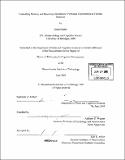Controlling memory and resolving interference : prefrontal contributions to flexible behavior
Author(s)
Badre, David
DownloadFull printable version (11.21Mb)
Other Contributors
Massachusetts Institute of Technology. Dept. of Brain and Cognitive Sciences.
Advisor
Anthony D. Wagner.
Terms of use
Metadata
Show full item recordAbstract
Flow does the brain meet shifting task demands? The experiments and formal theoretical framework presented in this dissertation characterize the cognitive and neural processes by which flexible performance is enabled during task switching. Chapter 1 reviews major findings and controversies in the task switching literature, highlighting (1) evidence that behavioral switch costs may derive from proactive interference due to the facilitated retrieval of irrelevant competitors from long-term memory and (2) the consistent finding of activation in ventrolateral prefrontal cortex (VLPFC) during task switching. These observations motivate the hypothesis that left VLPFC may resolve proactive interference arising from long-term memory during a task switch. Chapters 2 and 3 describe three fMRI experiments conducted in experimental contexts independent of task switching that directly link left mid-VLPFC (Brodmann's Area 45; inferior frontal gyrus pars triangularis) to a post-retrieval selection process that resolves proactive interference from irrelevant representations retrieved from long-term memory. Chapter 4 introduces a computational model that derives its task switch cost from interference due to performance-dependent changes in its associative structure, and that resolves this interference through a control process that biases retrieved conceptual representations. Critically, a conflict signal, derived from retrieved conceptual representations in the model, is shown to be characteristic of the pattern of response in left mid-VLPFC during an fMRI experiment that manipulates preparation and interference in task switching. Furthermore, this pattern dissociates left mid-VLPFC from other regions active during a task switch. (cont.) These data strongly support the hypothesis that task switch costs derive from proactive interference due to facilitated retrieval of irrelevant representations and left mid-VLPFC serves to overcome this proactive interference. Chapter 5 provides further details of the model, demonstrates its power to explain a number of common task switching phenomena, and explores its relationship with three other prominent formal models of task switching. The experiments and associated theory presented in this thesis provide evidence that instances of flexible behavior, like task switching, may be understood as acts of memory, and are enabled by prefrontal cortex mechanisms that control memory to overcome interference.
Description
Thesis (Ph. D.)--Massachusetts Institute of Technology, Dept. of Brain and Cognitive Sciences, 2005. Includes bibliographical references.
Date issued
2005Department
Massachusetts Institute of Technology. Department of Brain and Cognitive SciencesPublisher
Massachusetts Institute of Technology
Keywords
Brain and Cognitive Sciences.